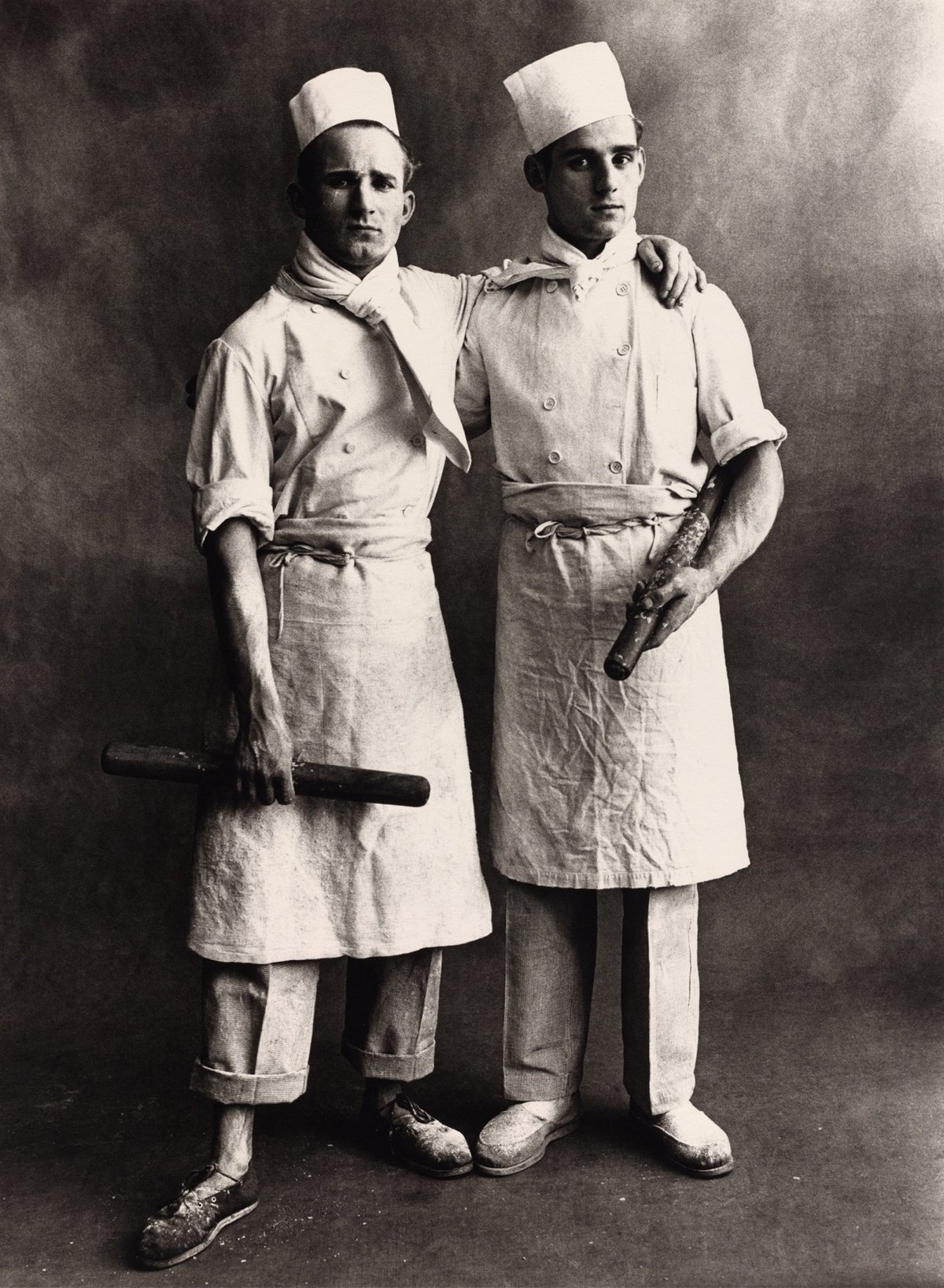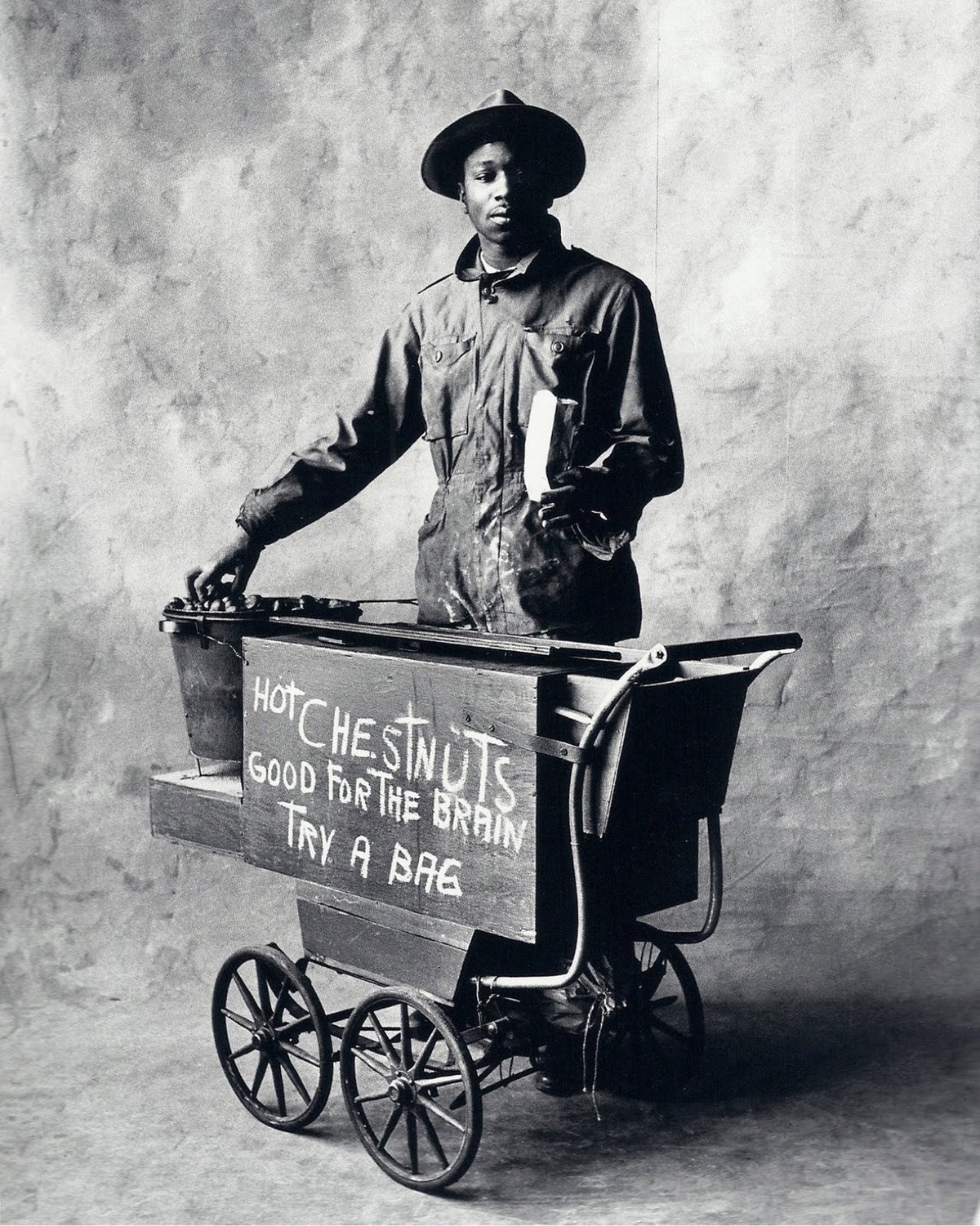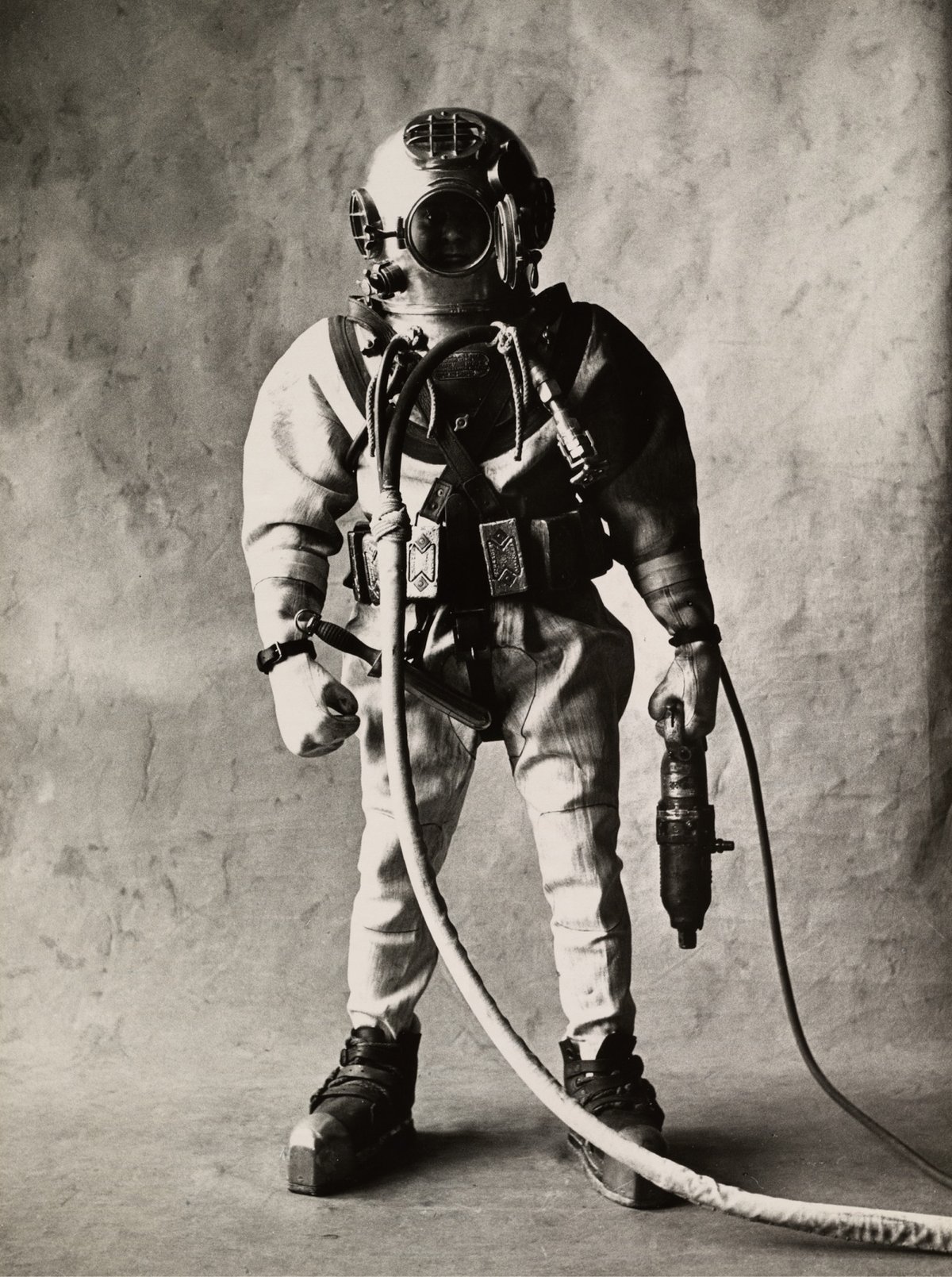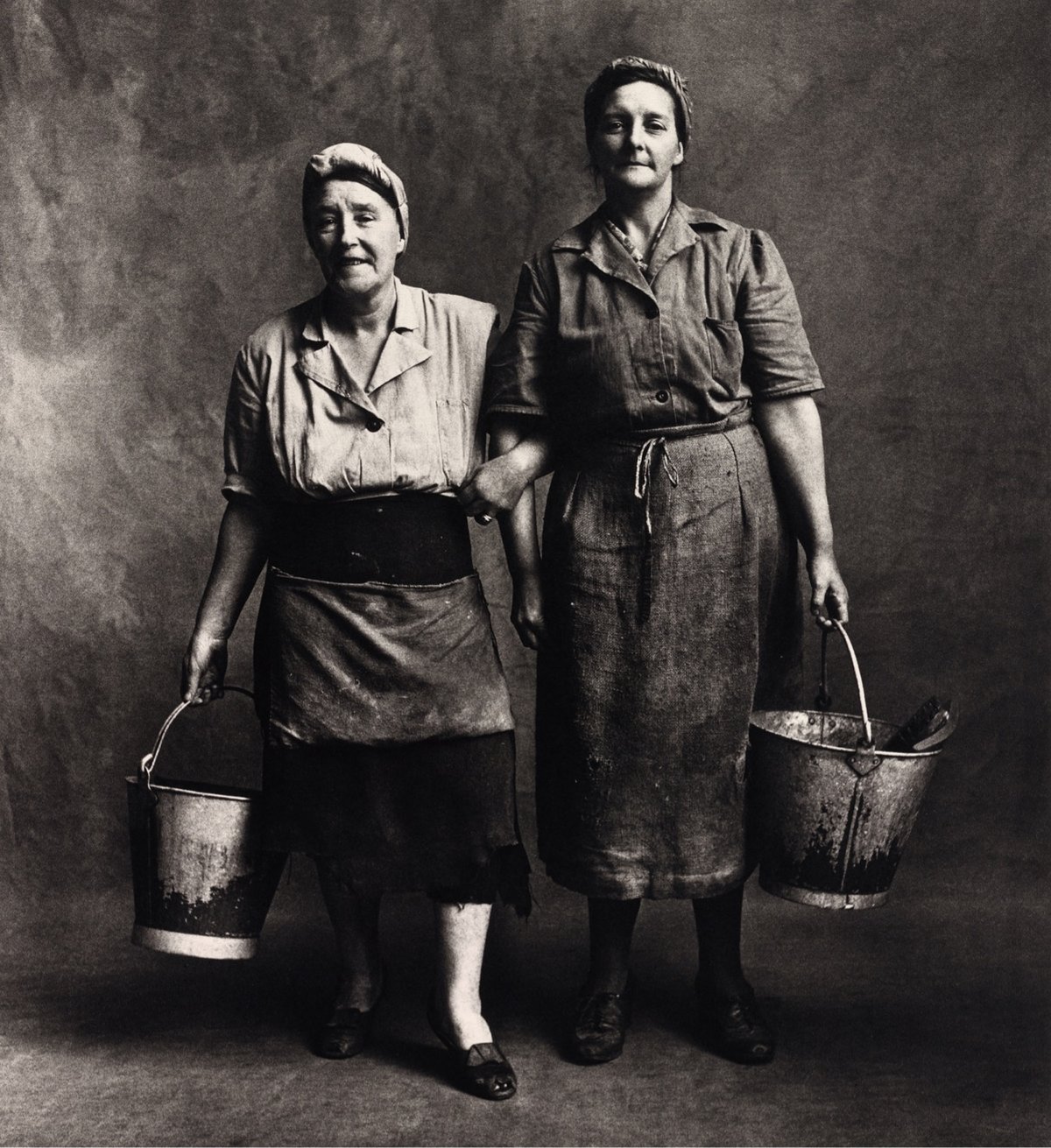
In 1950, master photographer Irving Penn set up a simple studio in Paris and started to photograph people of all kinds of professions, each wearing their work clothes and carrying the tools of their trade.

Working in the tradition of representing the petits métiers, Penn photographed fishmongers, firefighters, butchers, bakers, divers, baseball umpires, chefs, bike messengers, and sellers of goods of all kinds.

Penn continued photographing workers in New York and London, collecting the photos into a project called Small Trades.

Penn said of the project:
Like everyone else who has recorded the look of tradesmen and workers, the author of this book was motivated by the fact that individuality and occupational pride seem on the wane. To a degree everyone has proved right, and since these photographs were made, London chimney sweeps have all but disappeared and in New York horseshoers — hard to find in 1950 — now scarcely exist.
A possible companion to Penn’s photographs: Studs Terkel’s Working: People Talk About What They Do All Day and How They Feel About What They Do. (Fun fact: Terkel and his editor got the idea for Working from Richard Scarry’s children’s book, What Do People Do All Day?)
In 1974, Studs Terkel published a book called Working: People Talk About What They Do All Day and How They Feel About What They Do. One of the people he talked to for the book was Chicago police officer Renault Robinson. Robinson is African American and offered up his views to Terkel on how blacks are policed differently…here are the relevant bits of the interview. On traffic stops:
“About sixty percent of police-citizen conflict starts in a traffic situation. It’s easier to stop a person on the pretext of a traffic violation than to stop him on the street. It’s a lot easier to say, “Your tail light’s out.” “Your plate is dented.” “You didn’t make that turn right.” You can then search his automobile, hoping you can find some contraband or a weapon. If he becomes irritated, with very little pushing on your part, you can make an arrest for disorderly conduct. These are all statistics which help your records.
Certain units in the task force have developed a science around stopping your automobile. These men know it’s impossible to drive three blocks without committing a traffic violation. We’ve got so many rules on the books. These police officers use these things to get points and also hustle for money. The traffic law is a fat book. He knows if you don’t have two lights on your license plate, that’s a violation. If you have a crack in your windshield, that’s a violation. If your muffler’s dragging, that’s a violation. He knows all these little things….
So if they stop the average black driver, in their mind the likelihood of finding five or six violations out of a hundred cars is highly possible…. After you’ve stopped a thousand, you’ve got 950 people who are very pissed off, 950 who might have been just average citizens, not doing anything wrong - teachers, doctors, lawyers, working people. The police don’t care. Black folks don’t have a voice to complain. Consequently, they continue to be victims of shadowy, improper, overburdened police service. Traffic is the big entree.”
And on the type of young white male that the job was attracting at the time:
A large amount of young white officers are gung ho. It’s an opportunity to make a lot of arrests, make money, and do a lot of other things. In their opinion, black people are all criminals, no morals, dirty and nasty. So the black people don’t cooperate with the police and they have good cause not to. On the other hand, they’re begging for more police service. They’re over-patrolled and under-protected.
The young white guys turn out to be actually worse than their predecessors. They’re more vicious. The average young white policeman comes from a working-class family, sometimes with less than a high-school education. He comes with built-in prejudices. The average young white cop is in bad shape. I think he can be saved if a change came from the top. If it could be for just eight hours a day. They may still hate n***ers when they got off duty. They may still belong to the John Birch Society or the Ku Klux Klan. So what? They could be forced to perform better during the eight hours of work.”
Reading about this stuff, I keep going back to the 9 principles of policing drawn up by London’s Metropolitan Police in the 1820s in which the power of the police comes from the people, force is to be used minimally, and the efficacy of policing is judged on the absence of crime, not on the number of arrests or people sent to jail.
Redditt Hudson served as a police officer in St. Louis during the 1990s. He shared his perspective on race and policing with Vox last year: I’m a black ex-cop, and this is the real truth about race and policing.
It is not only white officers who abuse their authority. The effect of institutional racism is such that no matter what color the officer abusing the citizen is, in the vast majority of those cases of abuse that citizen will be black or brown. That is what is allowed.
And no matter what an officer has done to a black person, that officer can always cover himself in the running narrative of heroism, risk, and sacrifice that is available to a uniformed police officer by virtue of simply reporting for duty.
(via @tonyszhou)
In 1963, Studs Terkel interviewed a 21-year-old Bob Dylan, before he was famous.
In the spring of 1963 Studs Terkel introduced Chicago radio listeners to an up-and-coming musician, not yet 22 years old, “a young folk poet who you might say looks like Huckleberry Finn, if he lived in the 20th century. His name is Bob Dylan.”
Dylan had just finished recording the songs for his second album, “The Freewheelin’ Bob Dylan”, when he traveled from New York to Chicago to play a gig at a little place partly owned by his manager, Albert Grossman, called “The Bear Club”. The next day he went to the WFMT studios for the hour-long appearance on “The Studs Terkel Program”.
Dangerous Minds has more detail about the interview.
Bob Dylan is a notoriously tough person to interview and that’s definitely the case here, even this early in his life as a public persona. On the other hand, Terkel is a veteran interviewer, one of the best ever, and he seems genuinely impressed with the young man who was just 21 at the time and had but one record of mainly covers under his belt. Terkel does a good job of keeping things on track as he expertly gets out of the way and listens while gleaning what he can from his subject. It’s an interesting match-up.
Dylan seems at least fairly straightforward about his musical influences. He talks about seeing Woody Guthrie with his uncle when he was ten years old (Is this just mythology? Who knows?), and he mentions Big Joe Williams and Pete Seeger a few times.
Much of the rest is a little trickier. Terkel has to almost beg Dylan to play what turns out to be an earnest, driving version of “A Hard Rain’s a-Gonna Fall.” Dylan tells Terkel that he’d rather the interviewer “take it off the disc,” but relents and does the tune anyways.
(via @mkonnikova)









Stay Connected